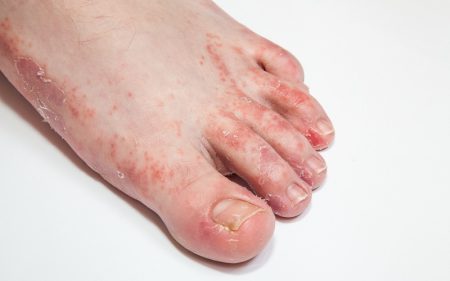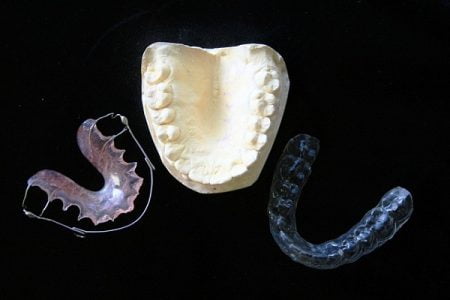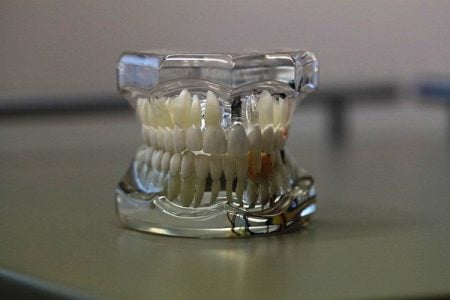Teeth Grinding (Bruxism)
Teeth grinding is a condition characterized by grinding, gnashing, gritting of teeth, and jaw clenching. Some people have a habit of clenching their teeth while sleeping; this is called sleep bruxism. People with sleep bruxism may suffer from certain sleep-related disorders such as snoring, pauses in breathing, etc.
Is Stress Linked to Teeth Grinding (Bruxism)?
Teeth grinding or bruxism has been often linked to stress and anxiety. According to a report suggested by The Bruxism Association, it has been found that 70% of cases of teeth grinding are related to increased stress levels. The stress that leads to teeth grinding can be of any type, such as work-related stress, financial stress, family stress, or daily life stress. It has been found that people working in a high paced and stressful environment are at a greater risk of stress induced bruxism.
People who are stressed often grind their teeth more frequently compared to normal people. Some research studies have suggested that people suffering from bruxism have higher levels of stress hormones in their bodies. Besides, stressed people might also show increased heart rate and brain activity before the bruxism episode. This implies that the nervous system may have a role to play in teeth grinding.
A combination of chronic stress and teeth grinding may sometimes result in sleeplessness called insomnia. In some cases, insomnia itself is the cause behind bruxism, which in turn leads to stress. Insomniac people often lack interest in work and other activities, this can result in professional or academic stress and ultimately bruxism. The levels of stress hormones in the body may rise with an increase in teeth bruxism.
Read About Baby Grinding Teeth: What Parents Should Do?
Management of Stress and Bruxism
Relaxation Techniques
Relaxation techniques have been found to be useful in the management of bruxism. These techniques manage the stress levels in the body, which provide relief from the symptoms of teeth grinding. Other symptoms like migraines, tension headaches, anxiety, and insomnia that are related to stress can also be managed with relaxation techniques. If a person is suffering from bruxism, he/she should consult a dentist first to know if there is any dental cause. Besides, he/she can opt for activities that will help him/her in the stress reduction.
Meditation
This is a process that involves deep breathing exercises with simultaneous inhalations and exhalations. It helps the body in getting relief from tension, anxiety, and stress. It also helps in the stabilization of the autonomic nervous system. Meditation relaxes your mind and body so that you will get rid of the regular bouts of bruxism. One of the major reasons behind bruxism is stress. Therefore it is important to get rid of unnecessary stress and anxiety and calm your mind. Meditation is an excellent way to calm your mind. Meditation should be done for 2 to 3 minutes twice a day to get the desired results.
Mindfulness
Like meditation, mindfulness is another technique to avoid stress-related bruxism. Meditation mainly focuses on breathing; however, mindfulness is about paying attention to whatever we are doing in a particular moment. Mindfulness should be put into practice throughout the day. Like meditation, mindfulness is an excellent technique to keep the mind focused and reduce unwanted stress. This, in turn, prevents the bouts of bruxism in people who have stress-related bruxism.
Yoga
The actual cause behind bruxism is still unclear, but there is a relationship between stress and bruxism or teeth grinding. Improper sleep, high stress, and long working hours have also been related to teeth clenching or bruxism. Yoga is a good option for people who have bruxism related to stress. Some bruxism-stopping yoga poses have been found to play a role in providing relief from bruxism. These poses are mentioned below:
Movement of Eyes Around the Clock
Close your eyelids and move your eyes around in circular motions twenty times left and then twenty times right.
Warrior 2 Pose – (Virabhadrasana II)
In this pose, your body gets stretched greatly with moderate pressure on your hamstrings and quads of your leading leg. You have to hold this pose for almost 10 breaths or up to a minute and then change the pose. After this, you can switch sides, arms, and legs.
The Camel Pose – Ustrasana
You can do this pose on the floor. This pose helps you in expanding your entire thoracic cavity and muscles of the neck. This pose can be a bit challenging if you lack flexibility. In that case, you can use a yoga block for your support.
Simplification of Life
Since bruxism has been found to be related to stress, therefore, a person should try to avoid the situations that will trigger anxiety and stress in him/her. Patience and calmness are the best ways to live a simple and stress-free life that will help avoid bruxism.
Self Care
Bruxism or teeth clenching or teeth grinding maybe your body’s way of telling you that things are not going well in life. Under such situations, you should pay more attention to your health to maintain good physical and mental well-being. Selfcare is also important to get rid of stress related to bruxism. Some of the self-care techniques that can be used are having healthier social interactions, reducing the workload. Having enough sleep, quitting smoking and other bad habits, and having a healthy diet.
Drugs for Bruxism
There are also some treatment options available for extreme cases of bruxism. Some researchers suggest that Gabapentin may improve sleep quality, reduce jaw clenching, and avoid the teeth grinding in bruxism sufferers.
FAQs
What Causes Involuntary jaw Clenching?
Doctors don't completely understand the cause of jaw clenching, but it may arise due to a combination of physical, psychological, genetic factors and dental problems. Sleep awakening due to jaw clenching (teeth grinding) may be due to emotions such as anxiety, stress, anger, frustration or tension.
Is Bruxism a Neurological Disorder?
Teeth grinding (bruxism) is a diurnal parafunctional activity that includes tooth clenching, bracing, gnashing, and grinding. Bruxism has been reported in some neurological disorders such as Rett syndrome, mental retardation, stress disorder, anoxic encephalopathy, cerebellar hemorrhage, huntington’s disease and parkinson’s disease. This means that bruxism is a secondary disorder of these neurological disorders.
Does Grinding Your Teeth Make Your Jaw Bigger?
If there is an increased use of muscles, the muscle size increases. Same is the It is the case with jaw muscles. Constant clenching and grinding may cause the muscle to enlarge, eventually giving a bulging, softened or square like appearance of jaw line.
Can Grinding Teeth Cause Problems?
Teeth grinding could lead to numerous problems like local muscular pain, headaches, gum recession, loose teeth, shortening of teeth, loss of tooth structure, tooth sensitivity, cracked and broken teeth, damage to the bone structure of the jaw joint with temporomandibular joint syndrome (TMJ syndrome), and even facial changes also.
Is Teeth Grinding a Sign of Sleep Apnea?
Waking up with tight and tired jaw muscles or sensitive teeth could be a sign that you clench or grind your teeth during the night, a condition known as bruxism. Nearly one in four people with obstructive sleep apnea grind their teeth at night, and men are more likely to be affected.






